- Polls apart - 4th March 2026
- Repeating on you… - 4th March 2026
- History man - 3rd March 2026

Disturbing news that the biggest airport in Wales was hit harder than any other in the UK by the pandemic, has raised serious questions among experts about why it was bought by the taxpayer in the first place for £52 million, when another was purchased by the Scottish Government for £1, and puts its long-term future in doubt, it has emerged.
One told The Eye: “These latest figures are damning of Cardiff Airport, and show the folly of buying it for millions of pounds”. Another aviation specialist said to our journalists: “This just shows it was ridiculous to pay all that money for Cardiff Airport. Bristol is doing much better. I just don’t see that it has a future.”.
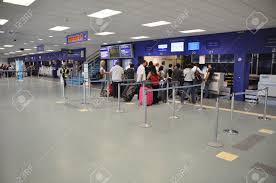
Cardiff Airport (CA) passenger numbers plunged by 87 per cent last year, with travellers there falling from 1,656,085 in 2019 to just 219,984 in 2020. Southampton Airport suffered an 83.4 per cent decline, London City Airport saw a drop of 82.3 percent in passenger figures, with numbers at Leeds-Bradford Airport going down by 81.2 per cent. Glasgow Prestwick (which was bought for £1) experienced an 85.8 percent fall in passenger numbers.
The problems caused by these alarming figures have been exacerbated for CA by the news that an airline operator collapsed just weeks after it announced two new routes from the airport.
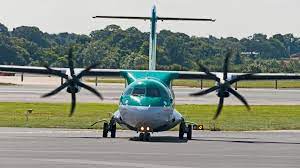
The Irish firm Stobart Air is in the process of appointing a liquidator, and the sudden announcement that it was ceasing trading came hard on the heels of it revealing on May 5, two new routes to Dublin and Belfast, which were to begin from Cardiff later this summer.
If passengers want to fly from Cardiff to Jersey it takes between 11 and 22 hours, with two stops en route.
This worrying information also came soon after it was announced with huge fanfare in the mainstream media, that the Hungarian budget airline Wizz Air (WA) was basing itself at the troubled airport (it had been described as a ‘British’ airline in the South Wales Echo [SWE], and it IS London-listed, but eastern Europe-focused), yet it cancelled the new Cardiff to Jersey service before it even started, and this caused a furore on Facebook (FB).
One critic said sarcastically: “Wizz air have cancelled all flights from CWL-JERSEY, well done CWL”. However another wrote that Mark Drakeford (the First Minister of Wales [FMW]), and the Welsh Government (WG) should be blamed.
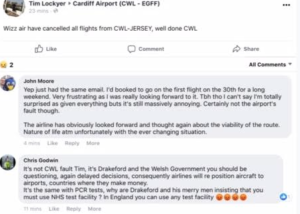
This comment is almost certainly a reference to the facts that in March the WG said a £42.6 million grant had been given to CA and “a similar level of debt written off”. The then deputy minister for the Welsh economy, Lee Waters MS, said that had they not done this it would have shut, saying: “It would have closed. We know there are roughly 2,400 aviation-related jobs that would have been directly impacted by (closure) and in total over 5,000 indirect jobs, supported by the airport. That would have been a loss to the taxpayer of £115 million.”
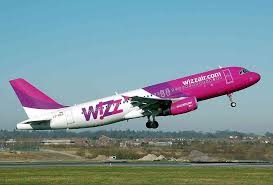
The latest unnerving details about CA’s passenger numbers, the closure of an airline and cancellation of flights, are set against a difficult background for the airport, as it has also had to confront a series of challenging headlines.
The news about the ‘headquarters’ for WA in the mainstream media had avoided the real story of the huge controversies which were swirling around it, and that the company had resorted to legal action when an anonymous source revealed how officials had allegedly slashed salaries by a quarter and sacked staff. One report in WalesOnline stated: “Good news for holidaymakers as a budget airline has announced a new permanent base at Cardiff Airport providing flights to destinations across Europe and Egypt. Wizz Air will also create 40 jobs as it brings nine new routes in a much-needed boost for the airport.”

Managing Director Owain Jones said: “This (move to Cardiff) reflects Wizz Air’s continued commitment to serving the UK market and generating economic growth, as we create local jobs, stimulate the tourism and hospitality industries and deliver on our promise of providing affordable, direct flights to exciting holiday destinations”.
Yet critics on social media were highly sceptical, with one onlooker saying on Facebook (FB): “Wizz is a low-cost disruptor airline”. Comments like this, were reflected in the unease of workers within the industry. Eion Coates, the head of aviation at the European Transport Workers’ Federation (ETF), had a slightly different view about WA than the mainstream media in Wales. He told AeroTime News (ATN): “Our biggest concern is that the company (WA) has both the money and the time to pick up all domestic routes that are now open in Europe”.


However it has not simply been the WA announcement that the mainstream media have been uncritical of, as acres of space were devoted to what was actually a highly-controversial event. It has also been the nature of the reporting about CA’s news that it was linking-up with the state-owned Qatar Airways (QA). This, too, had been greeted by enormous fanfare both from the mainstream media, and senior Welsh politicians alike.
The UK Government, though, told potential travellers to Qatar that they faced major risks, and it stated on its advice website: “Terrorists are likely to try to carry out attacks in Qatar“. Eight sovereign nations around the world have severed diplomatic ties altogether with Qatar and in July 2017 it was reported that the state had been cut off by some of its neighbours over alleged terrorist support.
 Qatar denies backing groups linked to Islamic State (IS) although it does admit it supports the Muslim Brotherhood. The emirate had refused to comply with an initial list of 13 demands, saying it would not agree to any measures that threatened its sovereignty or violated international law. But it was told by its neighbours that they wanted it to accept six broad principles on combating extremism and terrorism.
Qatar denies backing groups linked to Islamic State (IS) although it does admit it supports the Muslim Brotherhood. The emirate had refused to comply with an initial list of 13 demands, saying it would not agree to any measures that threatened its sovereignty or violated international law. But it was told by its neighbours that they wanted it to accept six broad principles on combating extremism and terrorism.

Nevertheless, the announcement over CA linking up with QA was widely applauded. In April 2017 BBC Wales’s Economics Correspondent Sarah Dickins said approvingly: “The new direct route from Cardiff to Doha (Qatar’s capital) is a reminder not just that the economy of Qatar is growing significantly but also that trade between Wales, the Arab world and beyond is increasing”.
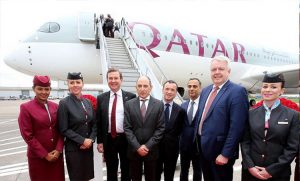
When the first flight from Doha was due, WalesOnline reported faithfully the words of Roger Lewis, then Chairman of CA, when he said: “This is a pivotal moment for Cardiff Airport, for Wales and the South West of England. The far reaching consequences of this service for passengers and businesses will be transformational”. The same praising word was used by the Chief Executive of CA at the time, Deb Bowen Rees, who told the South Wales Echo: “The Qatar Airways service has been transformational…”.
In interviews, Carwyn Jones (First Minister of Wales [FMW] when it was announced) stated: “We would like to work with his excellency (Akbar al Baker the Chief Executive of QA)“. Mr Jones tweeted that he “welcomed” the first QA flight into CA and said it represented a “huge boost” for Wales. The then Welsh Secretary Alun Cairns informed us: “The new flight from Cardiff to Doha plugs our entrepreneurs straight into one of the most dynamic economies in the Middle East, and an airport which offers a further 150 global destinations”.
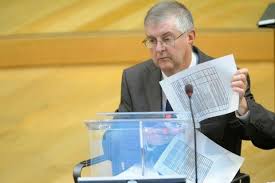
However, underlying all these remarks by politicians has been the strange disparity between owning an airport, while at the same time officials condemn attitudes which contribute to climate change.
The present FMW Mark Drakeford has proclaimed the importance of a new climate change ministry, declaring: “The environment will be at the heart of our decision-making”. His health minister, Eluned Morgan MS, proclaimed: “Enjoy everything Wales has to offer”.

Meanwhile media outlets had breathlessly reported the (understandable) excitement of Garry Tate from Cardiff that he had reached the check-in desk of CA only to be told he could not fly to Spain because of the pandemic, yet creating greenhouse gases from flying sits uneasily with the WG’s environmental policy, and Mr Drakeford announcing in the Senedd Cymru/Welsh Parliament (SC/WP) that people should holiday at home.
Recent comments about CA’s performance generally on FB have been extremely critical, as well.

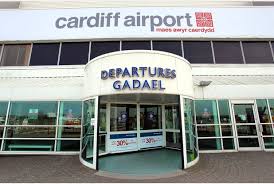
A former worker at CA, who said he had been at the airport for 19 years declared that he was sad to see the direction it has now taken. Andrew Smith said that CA was “Once a thriving airport with many overseas carriers”. He added: “Now they have 3 or 4, which are just bucket and spade flights…….sad times”.
A further FB post from a different person was: “the situation is dire… the survival of the airport as a Civil concern is dependent on how long Mr Drakeford (Mark Drakeford – the First Minister of Wales [FMW]) is willing to pump our money into the place – plus a bit of luck” with a worried face emoji after the disturbing message.
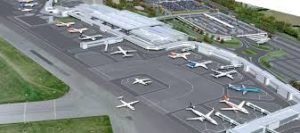
Another FB message, again from a different critic, was sent directly to CA, and also highlighted the problems. He stated angrily: “I resent flying from Bristol..”.
The disturbing news about QA and WA coupled with the falling passenger numbers, are also set against other unsettling backdrops, with the last Boeing 747s leaving the contentious airport. The withdrawal of the Jumbo Jets marks the end of an era, and the potential loss of a huge number of jobs in South Wales of workers who maintain the fleet.
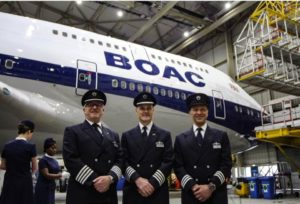
The final 747 (Jumbo Jet) has now gone, leaving CA virtually empty, and it means a massive drop in work for the maintenance base next door, which used to look after the fleet of 30 747s that have now been scrapped.
The loss of maintenance work, means there will be 120 fewer engines plus replacements to work on, and the nearby facility at Nantgarw will also be severely affected. It is likely that the pilots and the long haul cabin crew could now be facing redundancy.
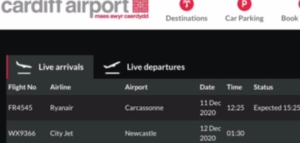 Recently the departure board at the airport showed only THREE flights, including one from ‘Easyjet’ which is based at Bristol.
Recently the departure board at the airport showed only THREE flights, including one from ‘Easyjet’ which is based at Bristol.
CA has been less than successful, and the Dutch airline KLM confirmed it is suspending flights from Amsterdam to Cardiff, until next February.

The future of the airport has also been scrutinised by politicians in the SC/WP. Welsh Conservative MS Russell George, who speaks on transport issues, said: “Tot up the purchase price of £52 million, the current £38.2 million loan, and last year’s £21.2 million loan, and the airport could be in hock to the taxpayer to the tune of more than £110 million since it was bought by the government in 2013. This is unsustainable…”

Andrew RT Davies MS for South Wales Central (and leader of the Welsh Conservative Party) said: “… this typifies how rudderless this Labour Welsh Government currently is. One minute they’re cancelling an M4 relief road that would help boost Rhoose citing environmental factors, then declaring a climate emergency, and now they’re chucking millions at an airport. Shambolic. Wales deserves better than this chaotic and slapdash management of our economy.”
 It may be that there are more calls along these lines, after news that the largest airport in Wales was affected worse than any other in the UK by the pandemic, raising major questions among experts about why it was bought by the taxpayer for £52 million, and whether it has a long-term future…
It may be that there are more calls along these lines, after news that the largest airport in Wales was affected worse than any other in the UK by the pandemic, raising major questions among experts about why it was bought by the taxpayer for £52 million, and whether it has a long-term future…
Tomorrow – why many see the shock resignation of Wales’ main independence organisation founder as showing it is in complete disarray over an extraordinary internal battle about transgenderism, with one supporter tweeting that there is “fear for the movement” and another saying it is in a “very precarious position”.
Our Editor Phil Parry’s memories of his astonishing decades long award-winning career in journalism (which often involved providing awkward facts) as he was gripped by the rare neurological disabling condition, Hereditary Spastic Paraplegia (HSP), have been released in a major book ‘A GOOD STORY’. Order the book now!










